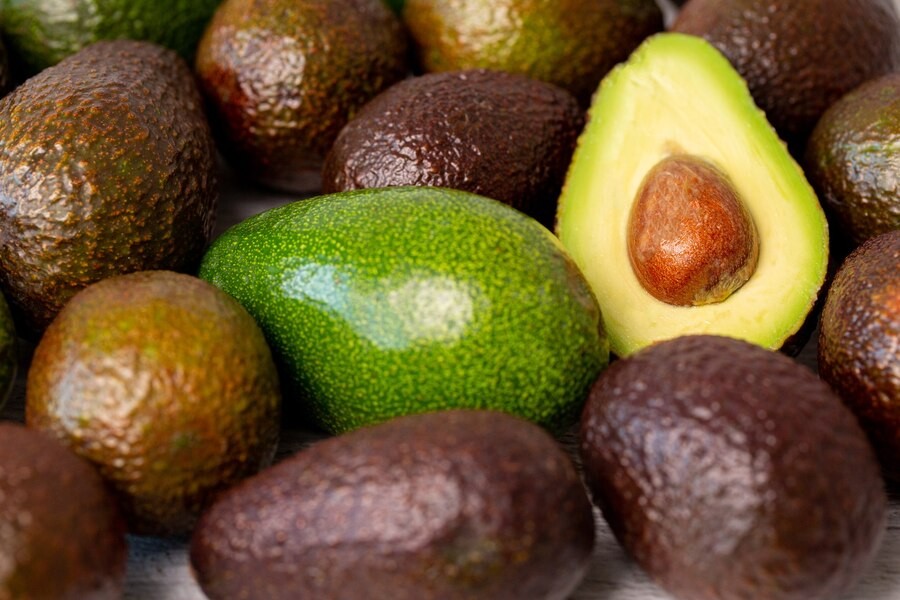Avocado is a highly popular fruit due to its creamy texture and delicious flavor. It can be enjoyed fresh, made into juice, added to sandwiches, or even used as an ingredient in making pudding.
Rich in healthy fats, vitamins, and minerals, avocado offers numerous benefits for overall health. Let’s take a closer look at the nutritional content of avocados and how it benefits the body.
Nutritional Content of Avocado
In every 100 grams of avocado, you’ll find a range of essential nutrients beneficial for your body, including:
-
Calories: 160
-
Fat: 14.7g
-
Sodium: 7mg
-
Carbohydrates: 8.5g
-
Fiber: 6.7g
-
Sugar: 0.7g
-
Protein: 2g
-
Magnesium: 29mg
-
Potassium: 485mg
-
Vitamin C: 10mg
-
Vitamin E: 2.1mg
-
Vitamin K: 21mcg
Health Benefits of Avocado Nutrients
Carbohydrates
The majority of carbohydrates in avocados come from fiber, making them an excellent choice for digestive health and preventing blood sugar spikes.
Avocados also have a very low glycemic index, which helps maintain stable blood sugar levels. This not only helps you feel fuller for longer but also supports overall digestion and metabolism.
Fats
Avocados are abundant in monounsaturated fats, commonly known as healthy fats. These fats can help reduce bad cholesterol levels, increase good cholesterol, and lower the risk of heart disease and stroke.
Additionally, monounsaturated fats promote the absorption of fat-soluble vitamins like vitamins A, D, E, and K. These healthy fats also play a key role in supporting brain health, improving cognitive function, and maintaining healthy skin and hair.
Vitamins and Minerals
Avocados contain a variety of important vitamins and minerals, including:
-
Vitamin K: Supports blood clotting and bone health.
-
Vitamin C: Enhances the immune system and acts as an antioxidant.
-
Vitamin E: Protects cells from damage caused by free radicals.
-
Vitamin B6: Contributes to protein metabolism and brain function.
-
Potassium: Helps regulate blood pressure and maintain fluid balance in the body.
-
Folate: Essential for cell growth and particularly important for pregnant women to prevent neural tube defects in the fetus.
Is It Safe to Eat Avocados Every Day?
Avocado is a safe fruit to be consumed daily but it should be eaten in moderation. Despite containing healthy fats, excessive intake can lead to weight gain.
If you have a latex allergy, it’s important to be cautious when consuming avocado, as it contains a protein similar to that found in latex. This could trigger allergic reactions in individuals who are sensitive to latex. If you have a latex allergy history, it’s advised to consult a doctor before consuming avocado.
By eating avocado in moderation and balancing it with a healthy lifestyle, you can enjoy the numerous health benefits it offers for overall well-being.
If you have further questions about avocado or other sources of healthy fats, you can consult a nutritionist or use the consultation service on the Ai Care app, available for download on the App Store or Google Play.
Looking for information about nutrition, food and other diet tips? Click here!
- dr Hanifa Rahma
Malia Frey, MA, ACE-CHC, CPT (2023). Avocado Nutrition Facts and Health Benefits. Available from: https://www.verywellfit.com/calories-in-an-avocado-3495640
Megan Ware, RDN, LD (2024). Why is avocado good for you?. Available from: https://www.medicalnewstoday.com/articles/270406
Stephanie Booth and Shawna Seed (2024). Avocado. Available from: https://www.webmd.com/food-recipes/all-about-avocados
BHF (2022). Are avocados high in fat?. Available from: https://www.bhf.org.uk/informationsupport/heart-matters-magazine/nutrition/ask-the-expert/avocado












